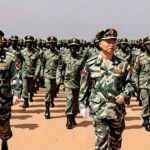China’s Role in Myanmar: Balancing Act for Peace
China has been engaged in notable diplomatic efforts in Myanmar to promote stability and peace, particularly in light of the rise of rebel groups in the northern part of the country. Given its significant economic and geostrategic interests in the region, China’s involvement has garnered close scrutiny from experts.
According to Jason Tower, the U.S. Institute of Peace (USIP) country director for Myanmar, China’s recent high-level visits to Myanmar are aimed at encouraging the military government to resume negotiations. Nonetheless, Tower contends that brokering a lasting agreement between rebel groups and the military government remains a formidable challenge, as both parties seem entrenched in their positions.
In a meeting with Myanmar’s junta chief Min Aung Hlaing, China’s Foreign Minister Wang Yi voiced the country’s opposition to chaos and conflicts in Myanmar, calling for stability along the China-Myanmar border. Conversely, Myanmar’s military government expressed appreciation for China’s support in its efforts to implement a roadmap for peace and stability, including preparations for a democratic general election.
The contrasting viewpoints on the planned election underscore a fundamental disparity between Myanmar’s military government and China. While the former deems the elections as essential, the latter remains skeptical about the feasibility of conducting an election given the current circumstances, especially with the military government controlling less than half of Myanmar’s territory.
Amid these developments, armed resistance groups under the Three Brotherhood Alliance have seized control of crucial facilities and infrastructure in northern Myanmar. Should the Myanmar military lose control over areas where Chinese projects are situated, China may feel compelled to engage with these rebel groups to safeguard its economic interests.
Nevertheless, despite the potential collaboration with rebel groups, China appears committed to engaging with diverse political factions in Myanmar as part of its long-term strategy to maintain influence and manage its relationship with the country. This approach entails meeting with leaders of Myanmar’s military government and engaging with other political actors.
While China seeks to prevent external interference and uphold domestic stability in Myanmar, it is inclined to support a peace process based on negotiation and reconciliation. Given the enduring presence of the military in Burmese politics, China is unlikely to endorse the complete removal of the military from the political landscape.
As conflict persists between rebel groups and Myanmar’s military, China’s role is viewed as that of an incremental facilitator, urging various resistance groups to consider its interests while gradually creating an environment conducive to potential ceasefire negotiations.
In summary, China’s engagement in Myanmar reflects a delicate balancing act aimed at promoting stability and peace, while safeguarding its economic interests in the region. The intricate dynamics at play in Myanmar require a nuanced approach from all parties involved, with China’s role poised to exert a significant influence on the country’s path toward peace and stability.








Post Comment